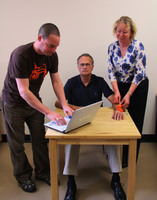Call for more research into MS after Jack Osbourne highlights illness

More research into Multiple Sclerosis (MS) is needed following the news that Jack Osbourne has the incurable illness, says Bristol charity MS Research.
Dr. Rosie Jones, chairman of the organisation, says that Jack’s diagnosis at the age of 26 is typical and highlights the need for more funding and research.
Rosie said: “Everytime somebody in the public eye is diagnosed with a particular condition the media become interested in that condition for a short time. The recently published news that Jack Osbourne has Multiple Sclerosis typifies this response.
“The many of us who care about MS and who want to see better knowledge of and treatment for the condition are glad of the opportunity to bring MS into the public arena.
“While feeling great concern for everyone diagnosed with MS, Mr Osbourne’s diagnosis represents a typical example of how the illness strikes – it comes out of the blue and affects mostly young people, sometimes even children, and once diagnosed there is the likelihood of ongoing problems and the development of some measure of disability.”
Jack Osbourne, son of infamous rocker Ozzie and former X Factor judge Sharon Osbourne is well-known for his dare-devil side taking part in many extreme sports. He also became a father earlier this year, when his daughter Pearl was born.
Rosie continued: “In MS the nerves in the brain and spinal cord are attacked causing widespread and difficult symptoms that will affect the rest of a person’s life.
“Perhaps one of the most difficult things to come to terms with after a diagnosis of MS is that nobody can tell you in any detail what will happen. The course of MS can be so individual from person to person that it is very difficult to predict the future and course of events.”
MS usually starts with a series of attacks followed by periods of remission; however, in rare cases the progress of the condition is continuous from onset.
Problems that develop can vary and managing the symptoms of MS –difficulties with walking, eyesight, sensation, pain etc - can be as important as addressing the causes in possible treatments for MS.
Rosie said: “MS Research has recently launched the MS365 appeal to raise funds for more research and better management of the condition. A day of laboratory research to investigate the complex reactions that lead to nerve damage may cost up to £500 a day and involve many specialists, while research into the management of MS by therapists and doctors may cost around £200. This research will have direct impact on people lives by improving the treatment of the many problems sufferers face every day.
“It is important that we conduct more research like this in order to help the millions of people diagnosed every year. MS is incurable at this moment in time but we have many new techniques to help us understand MS better and we can do a lot to make people’s lives more comfortable.
“We wish Mr Osbourne the very best of luck and good treatment and hope that by pushing harder and faster for better treatment we can eventually look forward to seeing the back of MS.”
If you would like to help the work of MS Research you can donate though the web site at ms-research.org.uk or by sending your donations to MS Research, The Vassall Centre, Gill Avenue, Bristol BS16 2QQ.

